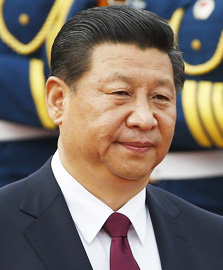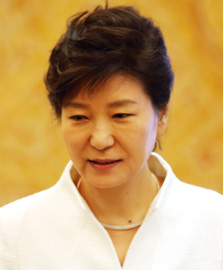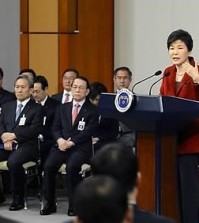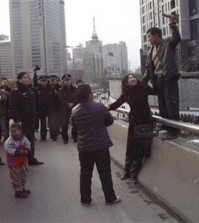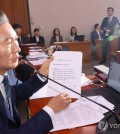- S. Korea unveils first graphic cigarette warnings
- US joins with South Korea, Japan in bid to deter North Korea
- LPGA golfer Chun In-gee finally back in action
- S. Korea won’t be top seed in final World Cup qualification round
- US men’s soccer misses 2nd straight Olympics
- US back on track in qualifying with 4-0 win over Guatemala
- High-intensity workout injuries spawn cottage industry
- CDC expands range of Zika mosquitoes into parts of Northeast
- Who knew? ‘The Walking Dead’ is helping families connect
- California Assembly OKs highest minimum wage in nation
Park, Xi to meet in Seoul
By Chung Min-uck
Chinese President Xi Jinping is likely to visit Seoul for a summit with President Park Geun-hye next month at the earliest, according to government sources on Friday.
Xi’s visit would mean closer ties between the two countries, coming at a time when the United States and Japan are closing their ranks in what Washington calls a “rebalance” to Asia in an attempt to stem China’s hegemony.
Chinese Foreign Minister Wang Yi be will be in Seoul around May 26 to finalize Xi’s visit and the summit agenda, foreign ministry officials said.
“Wang will be here for three days and hold talks with President Park and Foreign Minister Yun Byung-se,” the ministry official said.
North Korea’s nuclear program will likely be put high on the agenda, they said.
China, North Korea’s key ally and economic benefactor, has recently become more frustrated with Pyongyang following a series of North Korea’s provocations that have heightened tensions in the region.
Xi has yet to hold a summit with North Korean leader Kim Jong-un but, contrarily, met three times with Park.
Xi’s visit, if realized, will also mark the Chinese leader’s first visit to Seoul since assuming his presidency in 2013.
During the meetings, Seoul and Beijing are expected to reassure their firm stance on North Korea’s denuclearization.
The envisioned visit comes as North Korea has threatened to conduct its fourth nuclear test in protest over the United Nations’ condemnation of its ballistic missile launches in March.
During phone conversations in April, the foreign ministers of South Korea and China agreed to make efforts to curb Pyongyang’s provocations and maintain peace and stability on the Korean Peninsula.
North Korea conducted nuclear tests in 2006, 2009 and February 2013, drawing condemnation from the international community and tightened U.N. sanctions.
Meanwhile, Wang’s visit also comes at a sensitive time when Japan, China’s regional archrival, is flexing its military muscles by attempting to exercise its right to collective self-defense.
Japanese Prime Minister Shinzo Abe Thursday called for a review of the interpretation of the Pacifist Constitution that has banned Japan from exercising the U.N.-bestowed right which would allow Tokyo to fight alongside its allies and beyond its borders.
The United States welcomed the decision because it wants to fully utilize Japan as its proxy in handling regional challenges in Northeast Asia including North Korean threat and containing Beijing’s growing military power.
On the other hand, South Korea and China voiced concern over Abe’s move, saying Japan might be returning to an era of militarism.
Japan ruled the Korean Peninsula as a colony in 1910-45 and controlled much of China during World War II.
Experts here worry Japan’s militarization may further intensify the regional rivalry between the U.S. and China which could force Seoul into an unfavorable situation of having to take sides between its military ally, U.S., and No. 1 trading partner, China.







